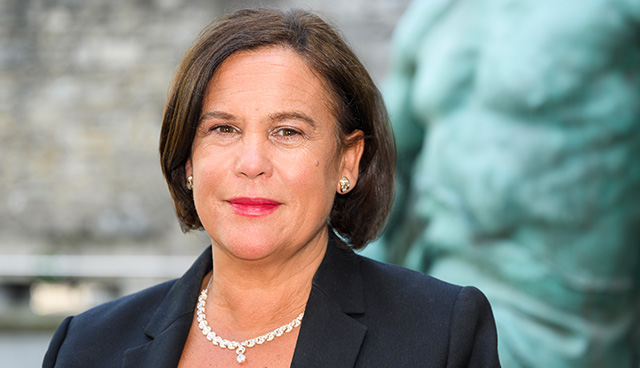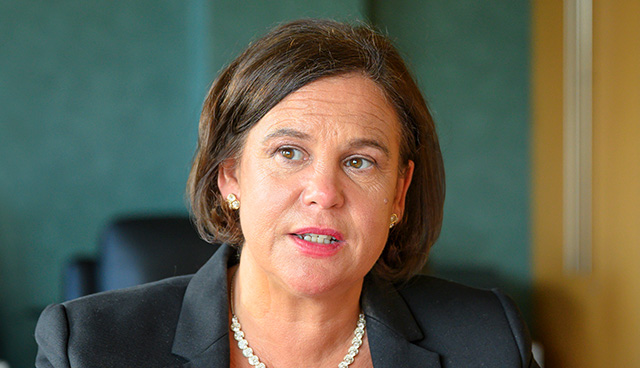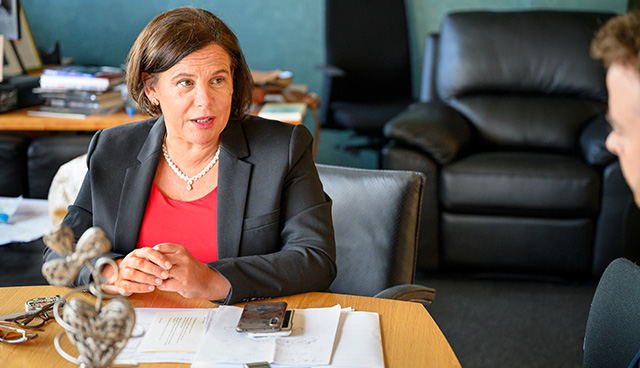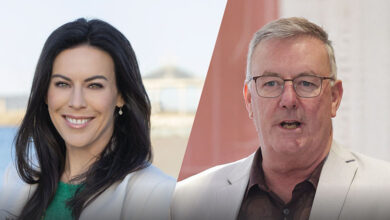Momentum for change: Mary Lou McDonald TD

For many years, the Civil War parties successfully dammed Ireland’s reservoir of electoral politics. Periodically, the flood gates opened, and coalitions of various hues came and went. Substantively though, the duopoly remained in control and spiritually intact. Sinn Féin’s relative electoral success in February 2020 finally caused the edifice to crack. By the time it was patched, a torrent of change had already altered the political landscape irreversibly. Ciarán Galway engages with Sinn Féin leader Mary Lou McDonald TD, now Ceannaire an Fhreasúra, to reflect on recent developments.
Having freshly emerged from the Dáil chamber and removed her mandatory face mask, Sinn Féin leader Mary Lou McDonald is visibly dissatisfied with the “complete non-answers” she reputedly received from Taoiseach Micheál Martin TD during Taoiseach’s Questions. The session, which overran its slot in the Dáil schedule by some time, has left her bristling with indignation.
A phalanx of Sinn Féiners enjoys a brief break in the sun splashed courtyard outside Leinster House 2000, while inside and upstairs, the party’s offices bustle with activity. The remnants of an earlier engagement litter the meeting table in McDonald’s well-lit but modest office. The leader of the Opposition is time poor.
Priority
In the context of the ongoing Covid-19 pandemic, the associated economic downturn and the tentative steps of the nascent Government, the Sinn Féin President’s priorities are myriad. Specifically, though, the most immediate priority, she says, is that the public health emergency is contained and the capacity of the HSE consolidated in preparation for a second wave. Secondly, McDonald adds, there is a need to get people back into work safely and prepare schools for a return of pupils. It is essential, she suggests, “to get back to what is called, and I know it’s a cliché at this stage, some kind of ‘new normal’” and to “establish how we live with Covid-19 and how we support the economy through stimulus”.
While acknowledging the importance of economic recovery, the Opposition leader emphasises the significance support for communities. “We’re very aware that when the crisis came, the glue that held communities and society together was largely voluntary effort. I think we shouldn’t lose sight of that,” she insists.
Remarking that “some of the most harrowing stories I have heard are from people who lost parents or grandparents in nursing homes”, McDonald is also cognisant of the pandemic’s impact on “people who are struggling with additional needs or some form of disability, their families, people who struggle with addiction and with all of the human dilemmas that confront us”.
The response, she asserts, must be the delivery of a swiftly assembled and holistic package of support services, adding: “We need a lot more than just lip service to mental health supports, for example.”
Public health response
Assessing the Fine Gael-led caretaker Government’s handling of the public health response to the pandemic from mid-March to late-June, McDonald commends its efforts. “I think ‘the caretaker government’, as it was called, was faced with a pandemic the likes of which hadn’t been seen for a century,” she says, adding: “To its credit and to the credit of the Irish system, the Government and its advisors had the good judgement to adopt the right approach of test, isolate and trace, which was the WHO advice. I think that was really important.”
Beyond this, the Opposition leader is guarded in her criticisms of the shortcomings in terms of supports for frontline workers and particularly those within the health service, adding that the Government “fell short on childcare provision and on the provision of PPE”.
“There were a lot of shortfalls. But the important thing is to accentuate the positives, to learn and then to mediate and correct the negatives,” she says.
Turning to the performance of the new Government, however, McDonald is scathing. “It has been chaotic. The first forays of this government; not very promising at all,” she remarks.

“I think there has been a massive confusion from start to finish. I have two teenage kids at home, I want them back at school. I know why they couldn’t be at school and why the schools needed to close, I entirely get that. But the children need to go back to school and it seems to me that with every announcement, more confusion is created.
“In terms of childcare itself, I think a really negative message was sent out during this week [commencing 20 July] when the Government voted down our motion for the 12-week extension to maternity leave. I think that said to parents, particularly to parents who have very small children, ‘you’re on your own’. Prior to Covid, it was difficult anyway to get childcare places for young infants. Many childcare facilities weren’t opening baby rooms because of the huge and onerous regulations.”
Jurisdictional alignment
Asserting that, in the context of the pandemic, the island of Ireland must be regarded as a single epidemiological unit, McDonald expresses her dissatisfaction and “alarm” at the Irish Government’s “passive” stance on jurisdictional alignment of the public health response.
“There is a memorandum of understanding – that’s good – but there hasn’t been that kind of dynamic engagement that we need. In fact, early on in the crisis, when Belfast, or a section of the [Northern] Executive was looking to Boris [Johnson] and to Britain for guidance, we were in a very dangerous situation where herd immunity and a laissez faire approach might have been adopted. That would have been catastrophic for the whole island,” she states.
However, McDonald naturally rejects the suggestion that Sinn Féin’s leader in the North, Michelle O’Neill MLA, has subsequently undermined her own political authority by contravening public health guidance and attending the funeral of erstwhile senior IRA figure Bobby Storey in Belfast.
“No, absolutely not. Michelle has led from the front and I think that’s what she’ll continue to do. I understand all of the sensitivities where there has been huge loss and huge hurt, particularly where people have died. Absolutely, I understand that. I think there was genuine upset at the time. I understand that also. We’re all human and we all have families.
“But I think Michelle O’Neill has been exemplary actually and I think only for her, the North and consequently the rest of the island would have been in a very vulnerable position. I think she ought to be commended for that.”
General Election 2020
After several retrograde electoral outings in quick succession, Deputy Mark Ward’s Dublin Mid-West byelection victory in late November 2019 appeared to herald a turn in the party’s prospects. This was confirmed by significant gains in the February 2020 general election. Retrospectively, the underestimation of its own popularity and the subsequent decision to field only 40 candidates has become a source of regret.
“If you mean should we have run more candidates, then yes. I think the maths tell you that,” McDonald concedes. However, the Sinn Féin leader denies that her party would have approached its campaign any differently in retrospect.
“I don’t think so. In truth, when we were out on the ground, it was very clear that a wide section of Irish society had decided for change and that a wide section of society regarded Sinn Féin not as the only, but the primary political vehicle to deliver that. People wanted us to be in government,” she says.
Conversely, while critical of her party’s subsequent exclusion from government, McDonald takes some satisfaction having shattered the concept of ‘the big two’ in Irish electoral politics. “That’s over. Even though we’re not in government, I think the election was absolutely transformational in that the old political establishment was essentially left with two options: either to deal with Sinn Féin and therefore to allow change in, or to coalesce formally this time and keep change out. Unsurprisingly, I suppose, it opted to coalesce,” she observes.
“I think the election was absolutely transformational in that the old political establishment was essentially left with two options: either to deal with Sinn Féin and therefore to allow change in, or to coalesce formally this time and keep change out. Unsurprisingly, I suppose, it opted to coalesce.”
Sinn Féin’s ascension to the largest opposition party is also notable in that it is the first time since the 1920s that a party other than Fianna Fáil or Fine Gael has led the parliamentary opposition in the State.
“It should be recalled, of course, that Fianna Fáil and Fine Gael had a confidence and supply agreement the last time around because we weren’t to be in government, but we certainly weren’t to lead the Opposition. They used that mechanism then, but the numbers did not allow for that particular ruse this time around. They were forced into this position. I have to say to you, in all honesty, that’s not a good result for Ireland,” McDonald insists.
Negotiations
Acknowledging the policy gulf between her party, Fianna Fáil and Fine Gael as being “evident and clear”, the Sinn Féin President is dismissive of the accusations of arrogance and of having possessed a sense of entitlement during the lengthy government formation period. “I never assumed, as some have asserted, that we had an automatic entitlement to anything, quite frankly, much less to being in government. That’s not how this works. I did simply point out that it was wrong, as a matter of principle, for the old establishment to decide that they would thwart and set aside the democratic choice of a very substantial section of Irish society,” she responds.
“I don’t recall a previous occasion in which the political establishment so openly proclaimed that it was keeping the view of such a substantial section of Irish opinion – not just us as individuals – out. It wore it as a badge of honour which was even more extraordinary. We know what the consequences of that will be, so we have to be on our toes, and we have to be an opposition that holds government to account. But we have to be more than that, we must maximise our leverage and our pressure to get the right results for people. I don’t underestimate that as a challenge.”
Mandate for change
Simultaneously, though, Sinn Féin was critical of the Green Party’s decision to enter negotiations and subsequently into coalition with Fianna Fáil and Fine Gael, suggesting it had thwarted the ‘mandate for change’. In reality, following the general election, Dáil arithmetic dictated that a left coalition was exceptionally unlikely. Indeed, it was apparent that any coalition involving Sinn Féin would also require either Fianna Fáil or Fine Gael.
“What we said is that as the numbers settled, there was a choice. You could choose to form a new government and a government of change or you could choose the same old same. Unfortunately, the Green Party made the latter choice. I respect that it was that party’s choice to make. There was an alternative government that could have been shaped and led by a progressive alliance, which would have included Sinn Féin but also the Green Party,” McDonald states.
Opposition
Given the ongoing pandemic, gathering economic headwinds and the difficult decisions which will face the new Government, it seems plausible to suggest that a stint in opposition might prove conducive to Sinn Féin advancing its ambition of entering government next time around. However, McDonald rejects this contention.
“It would have suited us better if we had been in government, but the cards have fallen as they have. I wouldn’t say that it suits us to be in opposition, we now lead the Opposition and we have a job to do. We fought the election on the basis of a wish to enter government and that hasn’t changed. Even as the leaders of the Opposition benches, I believe our job is to hold the Government to account, to deliver for and stand up for people, but all the while preparing ourselves for the next time and the next opportunity.
“We will go out, fight the next election and say to people that yes, we wish to be in government. I hope that next time around we can sustain that momentum for change, that we run more candidates, that we can get them elected and that the mathematics look very different,” she replies.
In the meantime, McDonald has affirmed that her party would act as “the most effective opposition in the history of the State”. Describing Sinn Féin as “a party of the left” with a republican programme, she emphasises a desire to break from the status quo.
“It means real opposition,” the TD for Dublin Central quips, elaborating: “I’m in the Dáil since 2011, almost a decade, and I have to say that the idea that there was ever really vigorous opposition when it was Fianna Fáil to Fine Gael and Fine Gael to Fianna Fáil is just not true. I haven’t witnessed it. I think we all know that the political dynamic in this State now for almost a century has been a ritualistic changing of the guard, but it’s always been the old guard, changing from one administration to another. We unambiguously represent a different approach to politics, a different kind of politics and different policy agenda. We want to deliver it.”

Inauspicious start
Having now restored confidence in her management, it is easy to forget about McDonald’s inauspicious origins as party leader. Having succeeded Gerry Adams as Sinn Féin President in February 2018, her party underperformed in three successive elections: the presidential election in October 2018 and again in the local and European elections in May 2019. From the outside, it appeared that McDonald’s leadership was coming unstuck.
“Of course, you feel the pressure; you’re in charge. I’m not one for shipping blame to others. I’m the leader of the party and that’s on the good days and on the bad days. You’re right. Initially, I had a baptism of fire and a succession of bad days. But I am a resilient person and I learn quickly.
“I always think that the most important thing when you make a mistake or when things don’t go as you had planned them, is that you get under the bonnet of it, figure it out and go again. A corner has been turned and that’s down to a collective real sense of purpose and I think it’s a credit not just to the Teachtaí Dála, the Seanadóirí or the people in here, rather it’s the Sinn Féin people out on the ground. It’s our activist base and people who work hard out there, so full credit to them for that.”
Discussing the modernisation of her party’s internal structures as well as its external image, McDonald believes that “we just have to be ourselves”. Accepting that “the past has been written into history”, she believes that what sets Sinn Féin apart is its “national ambition”. “This isn’t about jobs for the boys or the girls. It isn’t some kind of elaborate career structure. This is a political party with an agenda to deliver The Republic, to end partition and to create a society that is specifically and deliberately engineered with equality at its very core,” she illustrates.
Referring to the party’s association with the IRA, she adds: “I don’t wake up every day and say, ‘my god, you know, the militant past of the Irish republican struggle’ – and by the way, that militant past is actually in the history of all the political parties – no more than you get up in the morning and ponder, I don’t know, the 1798 situation. I look at the here and now and ask myself, ‘what are we going to do? How are we going to make things better?’ and then I get to work.”
Vision
In outlining her vision for the country in the short-term and from the Opposition benches, McDonald’s expresses an ambition to compel the Government to align economic recovery with social justice.
“I want us to ensure that government, even if it doesn’t want to and against its will and its own instincts, is forced into a situation to regard recovery as a holistic thing. Yes, it’s about the economy and yes, it’s about jobs, inward investment and corporate wellbeing, I accept that. But it also has to be about workers, families and communities and not the crumbs from the rich man’s table. I mean real opportunities and investment for people, because that will come back to us in spades. It’s the smartest approach that we can adopt.
“This is a political party with an agenda to deliver The Republic, to end partition and to create a society that is specifically and deliberately engineered with equality at its very core.”
“In terms of rebuilding the economy itself, it has to be about investment and not austerity. I’m really glad, actually, that that is an accepted norm for now. I am also savvy enough to know that this consensus may or may not hold. We are going to have to watch this under the current government very carefully, because I believe that its instincts will kick in at some stage, for me it’s only a question of when. I also want us to ensure that we keep politics connected with people outside of ‘the bubble’ because that is the guardian of the common good,” she concludes.





